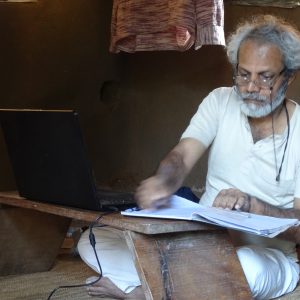
India’s is an agrarian economy, yet a farmer would rather be a doorkeeper with a monthly salary: Why? An interview with Prof Debal Deb

What are the greatest challenges facing Indian agriculture? It is not the burning question of the day—successive governments have systematically abandoned sustainable, traditional practices. The entry of corporate firms in agriculture (and banks, subsequently) not only affected long-term sustainability, the new farm bills passed by the government threaten to take over whatever little autonomy farmers had on the crops by opening up the markets to private players who would control the prices, taking away any government responsibility. Parul Abrol explores these issues in this conversation with Debal Deb. Well known for saving traditional varieties of rice, Deb is an ecologist by training. He is also a teacher, a conservator of endangered biota, and a fierce critic of corporate interests in agriculture.
Photo by Parul Abrol Parul Abrol: What’s the biggest challenge facing Indian agriculture? Debal Deb: The biggest challenge is to retain and restore the knowledge of sustainability. About 90 percent of mainstream farmers have lost their entire traditional knowledge of agro-ecological sustainability. The remaining are farmers on marginal lands. These include tribal areas, untouched by modern agricultural technology and techniques; drought-prone areas, where there’s frequent drought or no irrigation facility; wet lands or deep-water lands periodically or seasonally flooded. These are areas where Green Revolution seeds cannot perform at all. Farmers have to depend on their own heirloom seeds that are perfectly adapted to the drought conditions. None of the modern varieties will survive there, let alone yield any grain. Same goes for the coastal areas. These marginal lands are the last havens of traditional heirloom varieties of rice and other crops that are adapted to local environmental conditions….
Related Posts


Donald Trump’s Master Economic Plan I Opinion by Yanis Varoufakis




